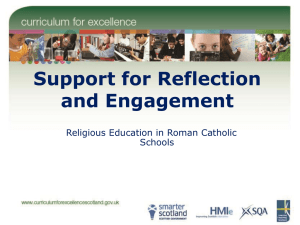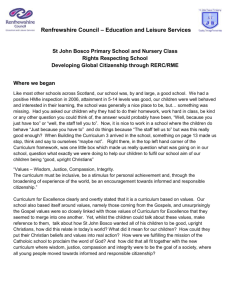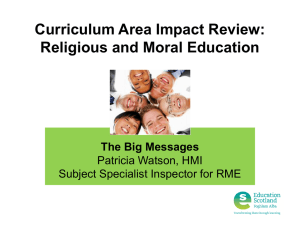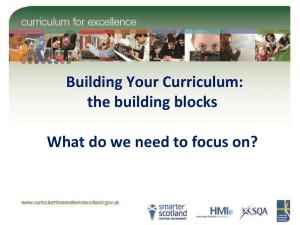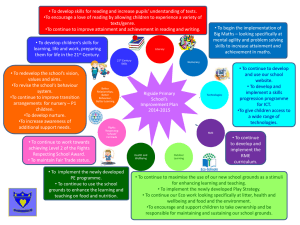Route Map through Career-long Professional Learning (CLPL) in Religious and
advertisement
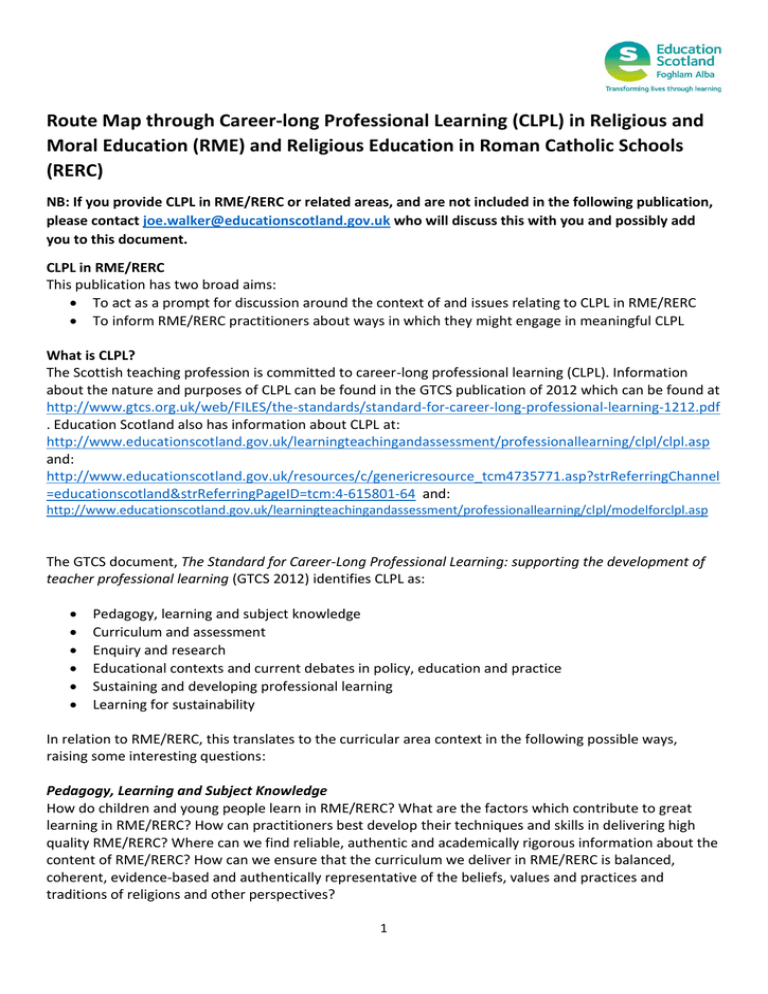
Route Map through Career-long Professional Learning (CLPL) in Religious and Moral Education (RME) and Religious Education in Roman Catholic Schools (RERC) NB: If you provide CLPL in RME/RERC or related areas, and are not included in the following publication, please contact joe.walker@educationscotland.gov.uk who will discuss this with you and possibly add you to this document. CLPL in RME/RERC This publication has two broad aims: To act as a prompt for discussion around the context of and issues relating to CLPL in RME/RERC To inform RME/RERC practitioners about ways in which they might engage in meaningful CLPL What is CLPL? The Scottish teaching profession is committed to career-long professional learning (CLPL). Information about the nature and purposes of CLPL can be found in the GTCS publication of 2012 which can be found at http://www.gtcs.org.uk/web/FILES/the-standards/standard-for-career-long-professional-learning-1212.pdf . Education Scotland also has information about CLPL at: http://www.educationscotland.gov.uk/learningteachingandassessment/professionallearning/clpl/clpl.asp and: http://www.educationscotland.gov.uk/resources/c/genericresource_tcm4735771.asp?strReferringChannel =educationscotland&strReferringPageID=tcm:4-615801-64 and: http://www.educationscotland.gov.uk/learningteachingandassessment/professionallearning/clpl/modelforclpl.asp The GTCS document, The Standard for Career-Long Professional Learning: supporting the development of teacher professional learning (GTCS 2012) identifies CLPL as: Pedagogy, learning and subject knowledge Curriculum and assessment Enquiry and research Educational contexts and current debates in policy, education and practice Sustaining and developing professional learning Learning for sustainability In relation to RME/RERC, this translates to the curricular area context in the following possible ways, raising some interesting questions: Pedagogy, Learning and Subject Knowledge How do children and young people learn in RME/RERC? What are the factors which contribute to great learning in RME/RERC? How can practitioners best develop their techniques and skills in delivering high quality RME/RERC? Where can we find reliable, authentic and academically rigorous information about the content of RME/RERC? How can we ensure that the curriculum we deliver in RME/RERC is balanced, coherent, evidence-based and authentically representative of the beliefs, values and practices and traditions of religions and other perspectives? 1 Starting Points The CfE RME Principles and Practice paper: http://www.educationscotland.gov.uk/learningteachingandassessment/curriculumareas/rme/nondenomin ational/principlesandpractice/ The CfE RERC Principles and Practice paper: http://www.educationscotland.gov.uk/learningteachingandassessment/curriculumareas/rme/rerc/principl esandpractice/index.asp Curriculum and Assessment The CfE programmes for RME/RERC have clear experiences and outcomes, but how can we be sure that the curriculum we follow based on these experiences and outcomes is appropriate, relevant and engaging? In RERC, what is the relationship between This is Our Faith and the RERC experiences and outcomes and what kind of curriculum design follows from this relationship? Also, how should we assess in RME/RERC, and what can we assess? How do we ensure and monitor progress in RME/RERC? Starting Points CfE RME experiences and outcomes: http://www.educationscotland.gov.uk/learningteachingandassessment/curriculumareas/rme/nondenomin ational/eandos/index.asp CfE RERC experiences and outcomes: http://www.educationscotland.gov.uk/learningteachingandassessment/curriculumareas/rme/rerc/eandos /index.asp Assessing progress and achievement in RME: http://www.educationscotland.gov.uk/learningteachingandassessment/assessment/progressandachievem ent/professionallearningresource/curriculum/rme/rme/progress.asp Assessing progress and achievement in RERC: http://www.educationscotland.gov.uk/learningteachingandassessment/assessment/progressandachievem ent/professionallearningresource/curriculum/rme/rerc/progress.asp This is Our Faith: http://www.sces.uk.com/this-is-our-faith.html Enquiry and Research What current research exists in RME/RERC and how does this contribute to our ability to deliver high quality RME/RERC? How might practitioners themselves engage in research in their own contexts? To what extent is our practice in RME/RERC based on rigorous peer-reviewed research and/or action research carried out by practitioners themselves? Starting Points The Scottish Educational Research Association: http://www.sera.ac.uk/ The British Educational Research Association’s RME special interest group: http://www.bera.ac.uk/group/religious-and-moral-education The British Journal of Religious Education: http://www.retoday.org.uk/benefit/bjre 2 Educational contexts and current debates in policy, education and practice How does educational policy impact upon RME/RERC? What are the policy drivers for RME/RERC nationally and locally? What are the current debates within RME/RERC and how do these impact upon delivery of RME/RERC? Starting Points Education Scotland’s Curriculum Area Impact Review Report: http://www.educationscotland.gov.uk/resources/0to9/rme/report.asp?strReferringChannel=learningteach ingandassessment&strReferringPageID=tcm:4-731910-64&class=l1+d157441 You should explore your own local authority’s/school’s policies on RME/RERC and consider the policies which exist in your own establishment. Sustaining and Developing Professional Learning What approaches can RME/RERC practitioners use for self-evaluation? How do these reflect broader strategies for self-evaluation within the Scottish educational community? How do RME/RERC practitioners develop subject leadership skills, and lead in the development of this curricular area? In places where RME/RERC is within faculty structures, how do faculty heads ensure that they develop their professional learning about RME/RERC? How best can school leaders and local authority officers keep abreast of current developments in RME/RERC? Starting Points Planning for learning, teaching and assessment in RME: http://www.educationscotland.gov.uk/resources/0to9/rme/report.asp?strReferringChannel=learningteach ingandassessment&strReferringPageID=tcm:4-731910-64&class=l1+d157441 S1-S3 Curriculum evaluation toolkit: http://www.educationscotland.gov.uk/resources/e/evaluatingandimprovingourcurriculum/introduction.as p?strReferringChannel=educationscotland&strReferringPageID=tcm:4-615801-64 Primary evaluation toolkit: http://www.educationscotland.gov.uk/resources/e/evaluatingandimprovingourcurriculumprimary/introdu ction.asp?strReferringChannel=educationscotland&strReferringPageID=tcm:4-615801-64 Examples of highly effective practice on improvement through self-evaluation; http://www.educationscotland.gov.uk/inspectionandreview/reports/examplesofpractice/selfevaluation.as p http://www.educationscotland.gov.uk/learningteachingandassessment/professionallearning/clpl/selfevaluation.asp Learning for Sustainability Understanding justice, equality and developing a sense of community are central to RME/RERC: How are these areas explored in RME/RERC? What links can be made through interdisciplinary learning (IDL) with other curricular areas and how can learning in RME/RERC be deepened through such learning? What does RME/RERC uniquely offer in relation to learning for sustainability and how can RME/RERC practitioners develop fully this aspect of this curricular area? 3 Starting Points The Scottish Government’s learning for sustainability report: http://www.scotland.gov.uk/Topics/Education/Schools/curriculum/ACE/OnePlanetSchools/LearningforSus tainabilitreport Education Scotland publications on sustainable development education: http://www.educationscotland.gov.uk/learningteachingandassessment/learningacrossthecurriculum/them esacrosslearning/globalcitizenship/sustainabledevelopment/introduction.asp Broad principles of CLPL and their link to RME/RERC Four broad elements of high quality CLPL have been identified by Education Scotland as below: Reflection on practice: Asking questions, being curious and looking closely at practice Developing skills in observing what is happening Developing skills in analysing and evaluating what is happening Exploring roles and approaches in professional practice. In RME/RERC this could translate into: Keeping a professional learning journal including self-reflection on practice Using video to capture and analyse learning and teaching Asking colleagues to observe and feedback on practice Devising questionnaires and other research methods to capture learners’ views on practice Experiential learning: Trying out and exploring the impact of approaches Experimenting and taking risks with innovative practice Examining outcomes and identifying learning from innovative practice Building new ideas into practice in structured ways. In RME/RERC this could translate into: Trying out a new way of exploring a familiar topic area Trying out a completely new topic area 4 Cognitive development: Being open to and seeking new ideas and practices Questioning assumptions about practice Using different sources to critically examine experience and practice Testing ideas and exploring the implications for practice. In RME/RERC this could translate into: Asking questions about the best ways to approach a particular topic Seeking the views of colleagues, including colleagues from non-RME/RERC backgrounds about approaches and methodologies Observing colleagues in other learning contexts and adapting their practices for RME/RERC contexts Collaborative learning: Working collaboratively to support each other in changing practice Sharing ideas and experiences through professional dialogue Seeking constructive feedback on practice and the impact on pupil learning Providing constructive feedback on practice and the impact on pupil learning. In RME/RERC this could translate into: Working with colleagues from other curricular areas to devise, deliver and review approaches in RME/RERC Setting up mentoring arrangements within establishments to share ideas and allow for the development of ‘critical friends’ networks Specifically, these broad approaches could lead to focussed CLPL activities as follows: Self-evaluation and reflection Experiential, action or enquiry-based learning Focused professional reading and research Curricular planning Peer support e.g. coaching or mentoring Classroom visits/observation Work shadowing Co-operative or team teaching Participation in collaborative activity e.g. professional learning community, learning round Leading or participating in a working or task group Planning learning which is inter-disciplinary or cross-sectoral Participation in activities relating to assessment and moderation Secondments, acting posts and placements Accredited courses or activity related to achieving national professional standards for teachers In addition, CLPL can contribute to the GTCS Professional Recognition process for practitioners. Information about this can be found at: http://www.gtcs.org.uk/professional-recognition 5 Accessing CLPL in RME/RERC Professional Reading and enquiry Appropriate professional reading should be a significant aspect of CLPL for all practitioners. This can cover a range of textual sources as suggested below, and offers practitioners the opportunity to update their knowledge and skills or develop new approaches to learning and teaching through the use of a wide range of source material: Books, novels, plays, textbooks, and other written sources: learning in the context of RME/RERC may be achieved by reading suitable texts. These can be within broad educational contexts, or may be very focussed on specific themes/issues and approaches covered in RME/RERC. Other media; TV programmes, theatre productions, internet sources: we live in an information-rich world. CLPL can involve accessing that richness to support and develop effective RME/RERC Professional journals/papers: Many professional journals are now available online – some incur costs and others do not. However, often school librarians are able to access journals and papers through, for example, inter-library loans and other processes. Anyone registered with the GTCS can freely access the EBSCO education source package through their MyGTCS account. This package includes a range of eBooks and full text for over 1,800 journals. Details of this can be found at http://www.gtcs.org.uk/ebsco Meetings with RME/RERC colleagues Some of the most beneficial CLPL can be accessed through interactions with colleagues in other contexts. These can be formal events, for example, meetings arranged by local authorities or organisations such as Education Scotland, or informal gatherings organised by practitioners themselves where ideas and resources are shared, talked about and developed. In addition, ‘Teach Meets’ and online webinars provide access to practitioners across the country and may be focussed on specific topics or more general open discussion areas. You can start a Teach Meet: http://teachmeet.pbworks.com/w/page/19975349/FrontPage Alternatively, Teach Meets can be arranged if you have access to Skype, Facetime or any other kind of online conferencing software. Education Scotland also runs Glow Meets where practitioners can login in and join in the debate and discussion. A full calendar of such events is here: https://portal.glowscotland.org.uk/establishments/nationalsite/GlowTV/tvpages/Schedule.aspx and if you don’t find anything of use, contact Education Scotland and ask for an RME/RERC Glow Meet or event. Note too that variety is useful here – CLPL as learning from across different sectors and learning contexts can be very valuable. Visits to places of religious and cultural significance Visiting a religious building or site provides a good level of CLPL. On such visits, learning strategies may suggest themselves, or be stimulated by learning materials produced by those responsible for the location or building. Most religious communities will welcome visits from RME/RERC practitioners and be keen to share their beliefs, values and way of life. Education Scotland’s Testimony website provides a map of such sites across Scotland and can be found at: http://www.educationscotland.gov.uk/testimony/about/faithmap.asp . 6 Also, it is important to note that ostensibly religious buildings and sites may not be the only source of CLPL concerning beliefs, values, practices and traditions. Many historical sites are rich sources of information about the role of beliefs, values, practices and traditions in Scottish life. Also, local places and buildings may provide rich sources of CLPL in relation to beliefs, values, practices and traditions such as: Memorials and monuments such as war memorials Cemeteries Buildings which are adorned with symbolic devices such as banks and historic houses Ancient historical sites – e.g. cup and ring sites, burial cairns, standing stones Virtual visits to places of religious and cultural significance If geographical location precludes actual visits to sites of special interest, much can be learned from virtual visits.. Many such virtual locations include virtual tours of the site, resource materials for practitioners, background information and so on. Some examples which might be ‘visited’, or information concerning locations are: http://www.reonline.org.uk/specials/places-of-worship/ http://www.rosslynchapel.org.uk/ http://www.glasgowcathedral.org.uk/ http://www.educationscotland.gov.uk/scotlandshistory/20thand21stcenturies/worldwarii/italianch apel/index.asp http://request.org.uk/life/church-life/2013/07/17/church-tours/ http://www.scojec.org/resources/files/guidebook.pdf http://www.mosquedirectory.co.uk/browse/mosque-locations/scotland http://www.sikhsinscotland.org/gurdwara.phtml http://www.hindutempleofscotland.com/ http://www.samyeling.org/ http://www.findhorn.org/ http://www.edin-bahai.org.uk/centre/ Museum visits Scotland has many museums which contain religious artefacts. Again, these can be visited as part of CLPL, and contribute to the development of a better understanding of the role of beliefs, values, practices and traditions. However, not only the more formal and extensive museums are of value here, local visitor centres and much smaller museums dedicated to specific aspects of life in Scotland may also provide a rich source of understanding of the ways in which people live their lives, and how their beliefs and values are linked to their lifestyle. Art galleries can also provide useful CLPL through studying artworks, religious or otherwise. Some particularly useful examples of museums which also have websites are: http://www.nms.ac.uk/ http://www.glasgowlife.org.uk/museums/st-mungos/Pages/default.aspx http://www.glasgowlife.org.uk/museums/burrell-collection/Pages/default.aspx http://www.blairsmuseum.com/ 7 Attending events linked to RME/RERC Throughout the year there are many events which practitioners can attend which can be useful CLPL in RME/RERC. These can be one-off day conferences run by RME/RERC-related organisations such as: http://www.educationscotland.gov.uk/ http://www.sjcrme.org.uk/ http://www.sces.uk.com/cpd-opportunities-.html http://www.interfaithscotland.org/ http://atres.org.uk/ Note however, that as well as structured educational events such as one day conferences, throughout the year a range of cultural celebrations, festivals and other events will be useful CLPL in RME/RERC – for example: Scottish Interfaith week: http://www.interfaithscotland.org/our-activities/scottish-interfaith-week/ Holocaust memorial day events: http://www.hmd.org.uk/ Edinburgh Mela: http://www.edinburgh-mela.co.uk/ Other special days and special events may provide opportunities to attend celebrations and festivals. Education Scotland provides calendars of the year’s events which can be used to search for related events in specific locations which can be found. http://www.educationscotland.gov.uk/resources/r/resourcecalendar/August.asp?strReferringChan nel=educationscotland&strReferringPageID=tcm:4-615801-64 http://www.educationscotland.gov.uk/resources/g/genericresource_tcm4674138.asp?strReferring Channel=educationscotland&strReferringPageID=tcm:4-615801-64 Short Courses CLPL in RME/RERC may involve signing up to a course of study. A range of short CLPL courses which support the delivery of RME/RERC are available online, and signing up to these may be an end in itself, or the first step in signing up for a longer and/or more involved course. Many courses provide certification, and some require the submission of course work. Others provide CLPL opportunities to broaden and deepen understanding of specific topic areas. Other courses may involve periods of attendance either in evening/weekend sessions or during the school day. Some examples of short courses/CLPL opportunities which are free or indicate where short courses may be accessed are below: http://www.open.edu/openlearn/history-the-arts/culture/religious-studies https://www.futurelearn.com/courses/upcoming http://www.bbc.co.uk/learning/subjects/religious_studies.shtml Some examples of short courses/CLPL opportunities which may involve cost are as follows: RERC Courses http://www.sces.uk.com/cpd-opportunities-.html Interfaith Courses http://www.interfaithscotland.org/our-activities/education-and-training/ http://re-handbook.org.uk/ 8 https://www.course-bookings.lifelong.ed.ac.uk/courses/R/philosophy-and-religion/ http://www.open.ac.uk/Arts/religious-studies/courses.shtml Some CLPL provision can be short-term such as a single day, evening or weekend. Extended courses and award-bearing courses Depending upon each practitioner’s level of expertise within RME/RERC, there is a range of courses which can be followed towards certification. These can also be fully or partly distance learning options or require some kind of attendance. A range of universities and further education colleges across Scotland, and beyond throughout the UK and worldwide, offer courses leading to qualifications - from undergraduate to postgraduate degree courses and everything in between. The key here is to consider: How much time can be allocated to such study? What is the short and long-term goal of such study? What are the cost implications of such study? In Scotland, some undergraduate study of topics relevant to RME/RERC is available across a number of Universities. Contacting the university directly will enable practitioners to ascertain what is offered and how far this suits individual needs. Scotland’s Universities are: www.gla.ac.uk www.ed.ac.uk http://www.st-andrews.ac.uk/ www.abdn.ac.uk/ www.strath.ac.uk www.dundee.ac.uk www.stir.ac.uk www.napier.ac.uk www.rgu.ac.uk www.gcu.ac.uk www.abertay.ac.uk www.qmu.ac.uk www.uws.ac.uk www.uhi.ac.uk www.hw.ac.uk www.open.ac.uk Postgraduate study is also available across a number of Scotland’s universities. This generally leads to four levels of qualification: Postgraduate Certificate; Postgraduate Diploma; Masters Degree; Doctorate. There are many postgraduate opportunities in the broad field of learning, teaching, education and pedagogy. However, there are some which are specifically linked to RME/RERC contexts: Part time Masters courses in subject areas linked to RME/RERC are available at the following universities: Aberdeen; Edinburgh; Glasgow; Stirling; Distance learning masters courses in subject areas linked to RME/RERC are available at the following universities: Bangor; University of London; Birmingham; Nottingham; Sheffield; South Wales; Wales, Trinity St David; Cliff College; Winchester; Chester. Further education colleges may also offer courses relevant to the delivery of high quality RME/RERC. The website http://www.collegesscotland.ac.uk/colleges-scotland-homepage can provide a useful entry portal for information about each college’s CLPL opportunities. Key Stakeholder Organisations in Scotland who can support CLPL in RME/RERC As well as websites and publications, some of the following organisations offer CLPL opportunities in the form of conferences and seminars, specific CLPL activities and courses. Check each organisation’s website for the range of services they offer. Note that some publications and events are likely to incur charge and some will not 9 Interfaith Scotland: http://www.interfaithscotland.org/ The Association for the Teaching of RME in Scotland: http://atres.org.uk/ The Church of Scotland: http://www.churchofscotland.org.uk/speak_out/education The Humanist Society of Scotland: http://www.humanism-scotland.org.uk/ The Religious Education Movement in Scotland: http://remscotland.org.uk/ The Scottish Catholic Education Service: http://www.sces.uk.com/ The Scottish Joint Committee for Religious and Moral Education: http://www.sjcrme.org.uk/ Summary Considerations CLPL is a vital component in the delivery of high quality RME/RERC CLPL is central to Scotland’s educational philosophy and to its teaching profession CLPL enables practitioners to engage reflectively and analytically with learning and teaching processes, and with other colleagues in this respect CLPL includes a number of potential routes, from professional reading through to formal postgraduate study CLPL should build towards a consistent pattern of professional activity rather than a piecemeal approach to learning CLPL should be assessed in light of its impact upon learning and teaching processes and outcomes 10
